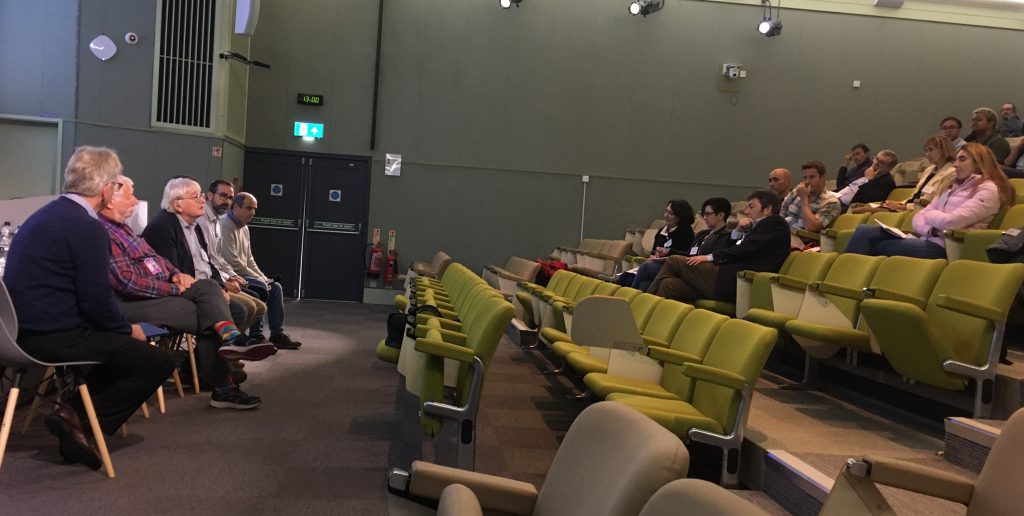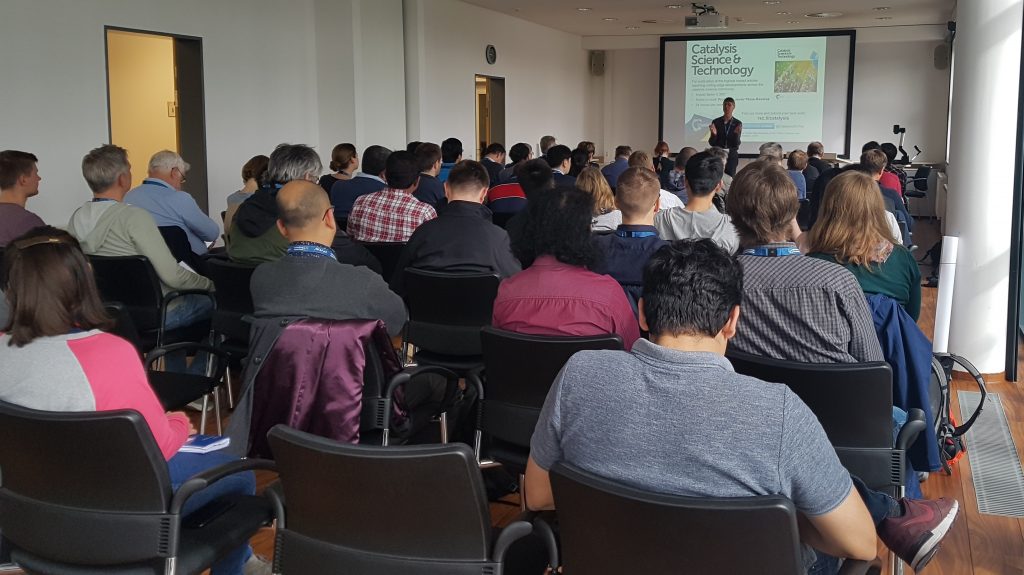UK – ITQ, Valencia Workshop 2023

Members of the UK catalysis Hub and ITQ met at the Harwell campus in September 2023 for an excellent discussion of the areas of mutual research and potentials for collaboration. The event focused on talks from established academics and ECRs from both facilities with at least half of the talks by ECRs. There was also a vibrant poster session. The conference started by introducing both research programs than looked at use of facilities and techniques moving on to cover photocatalysis, metal clusters, microporous catalysts, computational techniques and concluded with a panel discussion on future avenues for collaboration. The event concluded with tours of the UK Catalysis Hub facilities, Central Laser Facility, Diamond Lightsource and ISIS neutron source.
Members of both research teams are exploring avenues for joint collaborations such as Horizon 2020 funding and we look forward to continuing collaborations in the future.
US- UK Workshops with The DoE
In 2020 and 2021 the Hub in collaboration with the USA DoE ran a series of workshops aimed at promoting collaboration between US and UK researchers. Operando Catalysis for a Circular Carbon Economy focussed on identifying priority areas for fundamental research that would benefit from collaborative and coordinated programs to address knowledge gaps in catalysis science for sustainable conversions. These workshops lead to 4 Hub projects in collaboration with US institutions.
- Leveraging Operando Solid/Gas Hyperpolarisation to Directly Probe the Evolution of Active sites in Heterogeneous Catalysis (York, Glasgow, Durham and PNNL)
- Sonoelectrochemical carbon dioxide reduction for sustainable chemical manufacturing (MMU, UCL, Oxford and Lawrence Berkley National Lab. Industrial CoI: Twelve)
- Engineering Formolase Enzymes for Controlled Conversion of C1 Compounds into Multi-Carbon Molecules (Manchester, Cardiff, Washington, Industry CoI: BP)
- Micro-reactor for combined XAFS/XRD and Vibrational spectroscopy (Glasgow, Texas Tech, Stockholm University, and SLAC National Accelerator Laboratory)
UK- LIKAT meeting 2019

The UK Catalysis Hub held a two-day joint symposium with the Leibniz Institute for Catalysis in Rostock (LIKAT) in 2019. This meeting was excellent with talks from established academics and early career researchers from both communities. Following the meeting the UK Catalysis Hub signed a Memorandum of understanding with LIKAT to aid collaborations and several joint PhD students were set up between UK Catalysis Hub members and Academics at LIKAT.
- Jennifer Strunk with Andrew Logsdail (Cardiff) Design and Construction of Noble Metal/g-C3N4 Hybrid Heterostructures for Photocatalytic CO₂ Reduction
- Angelika Brueckner with Andy Beale: Preferential CO oxidation on Cu/ CeO2 catalysts
- Torsten Beweries with Simon Aldridge/Duncan Wass: mixed donor amine phosphinidene ruthenium complexes foe Guerbet catalysis
UK-South Africa Catalysis for Change Workshop, 2016
A bilateral meeting was organised with the C*change catalytic network in South Africa on the 16th on May 2016 to discuss opportunities for collaboration with Talks and discussions focussing on i) C1 chemistry including FT, CO₂utilisation and Syngas, ii) Hydrogen including Fuel cells Storage and Production iv) CH Activation v) Biocatalysis and vi) Reactor engineering. The meeting led to several applications for the newton fund and ongoing discussions about collaboration including the use of Diamond Light Source, and a follow up meeting in South Africa.
Following on from the discussion meeting held in 2016 with the C*change Catalysis Centre of Excellence in South Africa Dr Emma Gibson (Former Hub PDRA, Lecturer at Glasgow) formed a collaboration with Claeys and Fischer (University of Cape own). Several successful XAS experiments were performed on B18 at the Diamond Light Source (2017-2020), through collaboration with the UK Catalysis Hub. These experiments have resulted in 5 publications with the Catalysis Hub and associated researchers. In addition, Nico Fischer (Cape Town), Esna du Plessis (Sasol) and Emma Gibson (Glasgow) were awarded a RAEng Newton Award to run workshops on X-ray and Neutron data analysis and beamtime proposal writing (IAPP1R2\100065, £49,945.00). Through this programme, ANSDAC (African Neutron and Synchrotron Data Analysis Competency) ran three workshops from 2018 -2021, two in person in Cape Town and one via zoom due to COVID. This involved Diamond Light Source and ISIS Neutron and Muon staff as well as UK Academics travelling to Cape Town to provide training in data analysis to African researchers, with the aim of improving beamtime proposal success rates and increase the use of synchrotron and Neutron facilities by African researchers. The C*change meeting helped to make the contacts and initiate this part of the START programme: GCRF- START: Synchrotron Techniques for African Research and Technology – 513767 .
The meeting with C*Change also lead to a Newton fellowship: Phase transformations of nano-particulate heterogeneous catalysts captured in-situ: GJ Hutchings (Nico Fischer, Cape Town, South Africa) NA140201. In addition Simon Freakley (then Hub PDRA) Alex O’Malley (Hub PHD) and Michael Higham (GCRF START PDRA) visited South Africa for research collaboration and to provide training in experimental and computational techniques.
UK- Swiss Catalysis for energy workshop 5-6 October 2015
The UK Catalysis hub hosted a bilateral meeting on Catalysis for Energy with the Science and innovation network (SIN) Switzerland. The workshop was concerned with current and future research on catalytic solutions for sustainable energy sources and focused on fuel cells, transportation, photo-catalysis and bio fuels. The event brought together the UK and Swiss catalysis community to share expertise and identify complementarities for future collaboration.
So why do we think it is important to organise such a bilateral event? Well, both Switzerland and the UK have a matching level of academic expertise, with state-of-the-art facilities based on shared access, such as the soon to be launched SwissFEL — an x-ray Free Electron Laser at the Paul Scherrer Institute near Zurich, which will speed understanding of reactions at the atomic level. Research is done on an international scale and building partnerships with other countries is vital. Working together, British and Swiss researchers can share lessons learnt and technical know-how. Beyond addressing the fundamental and conceptual challenges of this core area of contemporary science together, researchers work with global companies, feeding results into the European innovative pipeline, for the next generation of energy efficient products and processes. This meeting was followed up with a UK visits to Switzerland in 2016.
UK- South Korea Workshop
A UK-Korean Workshop on Catalysis was held on 24-25th February 2015 in the Seoul National University, South Korea. The UK involvement in this was funded in part by the UK Embassy in Seoul and the UK Catalysis Hub. The purpose of this event was to bring together key UK researchers and Korean researchers on the topic of catalysis. The event was organised by Prof Seong Keun Kinm (SNU) and Prof Graham Hutchings (Cardiff). The UK participants in addition to Prof GJ Hutchings were Prof G Sankar, Dr N Dimitratos and Dr A Logsdail. The event was the fourth workshop in the series with two each having been held in the UK and Korea. Each participant presented a detailed account of their research activities. A general discussion ensued and based on this a series of actions for further collaboration was set out. The workshop was viewed as a way of enabling joint research on catalysis to be initiated and the agreed way forward included exchange samples of catalysts. This is the basis for setting up joint projects; exchange of research data and exchange students and PDRAs.




